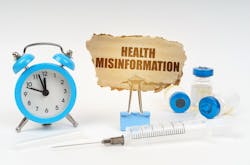An Increased Focus on Medical Misinformation in Academia
While Kim Lundeen was serving as a resident doctor in the Minneapolis area early in the pandemic, a patient asked her about a remedy rumored to cure COVID. The patient, who had tested positive for the virus, said she had heard advice circulating through her community that collecting and drinking her own urine would help her recover. The patient wanted to know whether Lundeen recommended the treatment.
Lundeen was prepared for this sort of conversation and the balancing act of accuracy and openness it would require. She had taken one of the University of Minnesota's first classes on misinformation. It taught her to spot, research, and counter false advice and faulty sources.
Misinformation courses, like the one Lundeen took, have been popping up in medical schools since the pandemic, which ushered in a myriad of conspiracy theories challenging doctors' reputations as trusted health experts. Equipping young doctors to spot misinformation and effectively educating the public and their patients is now integral to a successful medical practice, several medical educators told Medscape Medical News.
The two primary functions of medical school are to teach doctors what they must know and how to look everything else up, said Kristina Krohn, MD, a hospitalist and Lundeen's misinformation instructor at University of Minnesota. "If you can't do the latter well, you will be persuaded that safe things are inappropriate and inappropriate things are something you should do…You'll cause more harm."
Demonstrating its commitment to countering misinformation, the American Association of Medical Colleges (AAMC) teamed up this year with the Centers for Disease Control and Prevention (CDC) to award $29,000 grants to five academic medical centers to revamp their curricula. The grants are for "kickstarting" classes that teach how to mitigate health misinformation and provide vaccine education. Some grant recipients are pioneering workshops on the topics; others are revamping apps to help physicians respond to vaccine hesitancy.
"This is a natural evolution of medical education," said Andrea Anderson, MD, a professor at George Washington University School of Medicine, who helped choose the recipients of the AAMC grants. It has always been a clinician's job to accurately present health information to help patients make the best decision, she said. The difference is that now more than ever patients are inundated with more information from outside sources — some of it false and dangerous.
"There's an infodemic and I believe it's not going away," said Vineet Arora, MD, co-instructor of the misinformation course and dean for medical education at the University of Chicago Pritzker School of Medicine, one of the five AAMC grant recipients. "All our graduates should be well versed in communicating science to the public," she said, adding that UChicago is revamping its curriculum to include science communication.
